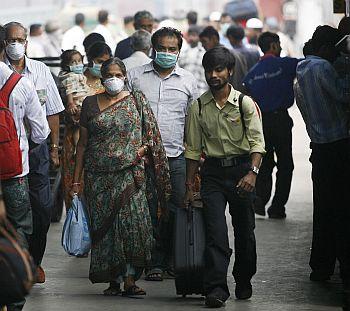 Extensive use of copper in public places can help combat spread of swine flu (H1N1) due to the red metal's anti-bacterial property, said a study by Professor Bill Keevil from the University of Southampton, Britain, presented at the BIT Life Sciences' Second Annual World Summit in Beijing on July 18.
Extensive use of copper in public places can help combat spread of swine flu (H1N1) due to the red metal's anti-bacterial property, said a study by Professor Bill Keevil from the University of Southampton, Britain, presented at the BIT Life Sciences' Second Annual World Summit in Beijing on July 18.
The study finds that copper-coated surfaces can significantly reduce the concentration of the influenza-A virus on them, raising hopes that it may also be effective against other strains of the virus.
About 75 per cent of influenza-A are knocked out in an hour on a copper surface and almost completely in six hours. The findings have come at a time when the world is fighting the H1N1 virus. The outbreak of the flu in India has triggered the need to use the most efficient measures to reduce its spread in public places.
While people have been advised to be alert and avoid crowded places, International Copper Promotion Council (India), or ICPCI, finds an opportunity for more copper use in public places.
"There is no particular answer to controlling the spread of pathogenic micro-organisms but copper surfaces may contribute to the number of control barriers able to reduce transmission of the virus," said Professor Keevil.
The H1N1 virus transmits the way any seasonal flu spreads. Flu viruses are spread mainly from person to person through coughing or sneezing. Sometimes, people may be infected by touching something with flu viruses on it and then touching their mouth or nose.
Last year, the U S Environmental Protection Agency (EPA) approved the registration of anti-microbial copper alloys, with public health claims acknowledging that copper, brass and bronze are capable of killing harmful bacteria.
Copper and copper alloy surfaces kill 99.9 per cent of bacteria within two hours, and continue to kill more than 99 per cent of bacteria even after repeated contamination. Therefore, the use of copper touch surfaces in hospitals, educational institutions, public buildings, public transport and food preparation areas can reduce the spread of harmful infections.
Copper and its alloys such as door handles, grab rails and bathroom fixtures, among others, are regular touch surfaces that can work to demonstrate reduced build-up and transfer of infectious pathogens.
Ajit Advani, deputy regional director Asia, International Copper Association Ltd and CEO, ICPCI, said, "In India, we have known about the protective properties of copper since the Vedic ages. This has now been corroborated by modern science. Use of this wonder metal in public touch surfaces can go a long way in reducing the spread of infections such as influenza."
Image: Travellers wearing masks walk on a railway platform in Pune
Photograph: Arko Datta/Reuters






